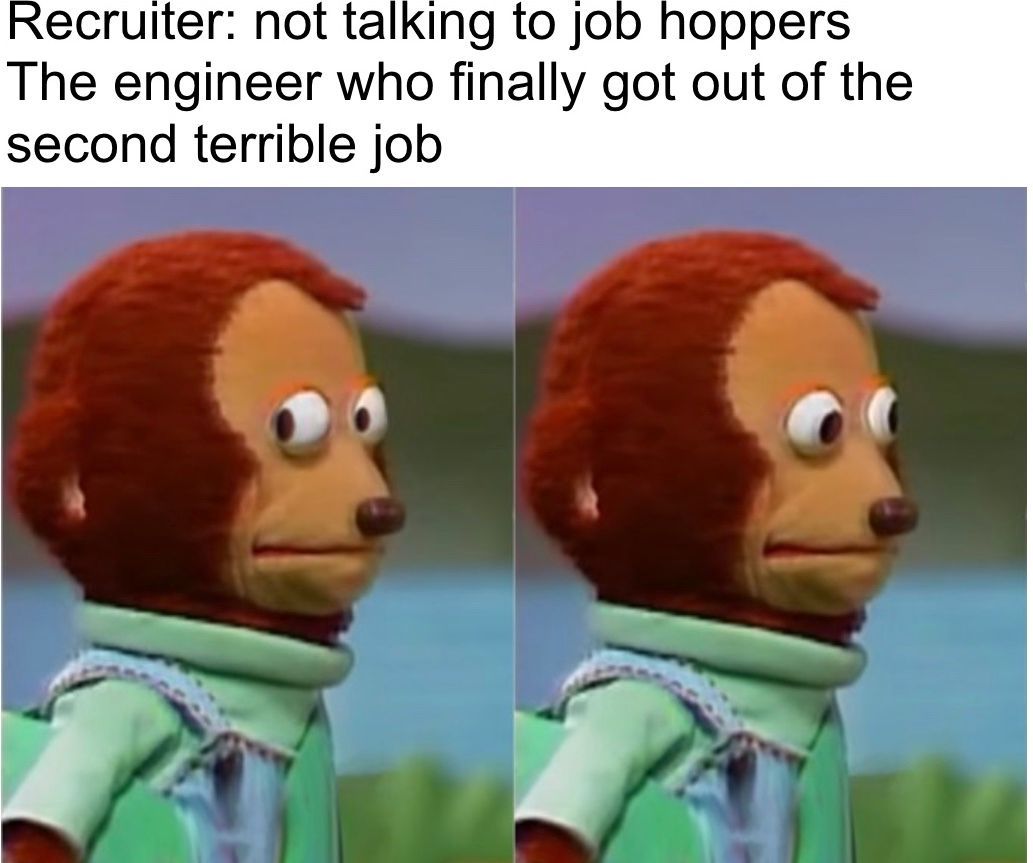Short Tenure – Red Flag Or Not?
When is short tenure a red flag?

One of the good old controversial topics – what to do with “job hoppers”? You look at the resume, and you see they've worked three jobs in the last few years. Is that something to be concerned about? Some recruiters or hiring managers will skip such candidates by default. I've heard a CTO say straight to a room full of recruiters to never even consider a candidate if they haven't worked for years at the same job. (I know these topics aren't mutually exclusive, but still). Now that I scared jobseekers adequately, let's discuss the topic.
Why do some companies consider this a red flag?
I'm very much against looking at tenure in itself – it's just data. Without making sense of it, it means nothing. I disagree that short tenure is always a red flag.
Some hiring managers and recruiters think short tenure shows a lack of loyalty – forgetting that employment is not a romantic relationship. No party has the moral obligation “stick it out” when things get awful. Employees have their lives and families to take care of, and companies need to ensure their success. There should be a buffer of course on both ends, but that's it. If companies want their employees to stay around, they need to build a great workplace and environment, pay them fairly and present them a compelling career growth story.
Another narrative I've heard is about “what can you learn in only nine months?!” — implying that short tenure leads to subpar skills. For certain profiles and levels, this might be true (e.g., being around and working on a product that evolves over the course of years and observing organizational growth in parallel can lead to obtaining valuable knowledge). Make sure you have folks in your organization who've already been where you're heading. Do you need every individual to have the same experience? Of course not.
Short tenure might mean any (combination of) these (and potentially much more):
- The candidate was unlucky and was part of a mass layoff
- The candidate was a contractor and the contract was renewed per project
- They didn't yet know what exactly they want and tried multiple jobs (compare to the zen Buddhist tradition of trying teachers until they found the right one)
- They were severely underpaid and they wanted to fix that
- They had a bad relationship with their manager, who wanted them out
- They couldn't put up with the real values and principles of the company (you know, not the shiny public ones they put on the walls and the career site)
- They are awful at their job and were rightfully let go
- They aren't fit for working in a team or have constant interpersonal issues
Now, can you tell which is happening just by looking at a resume? Thought not. Especially not in today's economic climate – I know two amazing engineers who'd been laid off twice in a course of a year recently, from otherwise promising companies because of tightening budgets. Don't be too hasty to judge.
Heck, I can even argue job hopping can be a good sign :P
- These folks are adaptable! Imagine how hard it is to onboard in a new job every 9 months!
- Depending on their reasons for leaving, they might have strong values, which is precisely what you're looking for (plus a good intersection with the company's values, of course).
- They aren't afraid to take risks! Not happy with your complacent team? Hire away! :)
So, what are we to do with job hopper profiles?
Well, as it usually is in life, it depends.
Do you have a good influx of incredible long-tenure profiles? Well then, besides fairness, you don't have an issue filtering these profiles out. You don't absolutely have to take risks (of wasting time in later stages). (You might want to think about the potential diversity of mindset these folks could bring to the table, though).
If you're not super happy with your top-of-the-funnel performance, consider rethinking your hard filters. If the candidate's profile is otherwise promising, try talking to job hoppers. You might find gems, and you'll definitely learn about the reality of the market from them.
All in all, this is about risks and tradeoffs. The risk of opening the floodgates near the top of the funnel is that you overwhelm your hiring pipeline with lower quality candidates (lower quality == lower chance of being hired).
If you decide to talk to these folks, listen to their stories. Be prepared with good questions around their short tenure and around the actual risks you're looking to mitigate/filter.
Be prepared that this is probably a sensitive topic for the candidates. They left those jobs for a reason. They are afraid you'll judge them on it. Be kind, show empathy, share personal stories from your career that relate to their situation. Emphasize that there's a reason you're talking – because you liked their profile. As usual, if you only get skin-deep answers, dig deeper.

Let's look a bit on the candidates' side – what are job hoppers to do?
I’ve only worked 8 months at this job, and it’s quite horrible. If I look for a new job now, will my short tenure be a red flag?
No, don't stay at a job that isn't working out for you and you see no way of improvement (after trying to improve things and talking to, e.g., your manager). There's a fine balance, of course, don't just flip the table at the first bad sign, but also don't stay just because you think you absolutely have to stick around no matter what.
Should candidates hide their short tenure jobs in their resumes? Let's be realistic: you want to show a good profile, recruiters screening CVs are a tough audience because they need to produce good results fast. It's not their fault. My advice: don't just list out your short tenure jobs, give a short reasoning/deeper dive for them! That can help with some biases.
I'll probably write more about resumes and presenting yourself, but there's an excellent series of posts by the amazing Annie Li on finding a job – see here. Here's one about CVs.
But what about the seniors?
Seniors vs. job hopping is a bit of a different story. There are certain traits of seniority which are really hard to practice without staying longer at companies.

Seniors need to deeply understand the product and the business domain they work in. This means being around as the product evolves, working with UX researchers, product managers experimenting, failing many times and learning from those failures.
Seniority requires having been around as the tech stack, architecture, and development processes changed and matured to meet the organizational and business growth. Experiencing first hand what needs to change when it's not 5 engineers working together on a monolith in a room and even managing those changes. Being there to see the long-term consequences of their architectural decisions.
Living through organizational changes is also an important experience here. Seeing how org structure changes with growth, how communication patterns stop working at different organization sizes, is something that's really hard to learn from blog posts.
Seniority also involves coaching and mentoring earlier stage engineers, and seeing this through takes time. Helping out a fellow teammate occasionally is very different from helping someone grow in their career for years.
All in all, while not impossible, it's quite rare to see true seniors without longer tenure at 1-2 jobs.
Conclusion
None? Many? I believe old recruitment habits and prejudices need to change. The market has been changing rapidly for the past few years, and it probably won't slow down much. Both players on the market constantly have to adapt, and the only way is to revisit our filters, biases, and needs. Learn empathy and keep your fingers on the pulse out there – one of the best ways is to actually talk to people on both sides of the table about their experiences.
